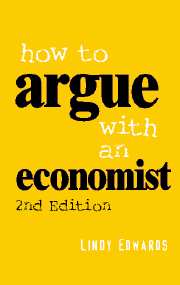Book contents
- Frontmatter
- Contents
- Acknowledgements
- Preface to the Second Edition
- Part I A Historical Juncture
- Part II Getting a Handle on Economics
- Part III Revealing Economic Rationalism's Worldview
- 6 ‘Punters’ versus ‘economic rationalists’
- 7 Contrasting views of human nature
- 8 Contrasting views of how society works
- 9 Constrasting views of the ideal society
- 10 Economic policy and culture
- Part IV Arguing with an Economic Rationalist
- Part V The Future
- Bibliography
- Index
6 - ‘Punters’ versus ‘economic rationalists’
Published online by Cambridge University Press: 14 October 2009
- Frontmatter
- Contents
- Acknowledgements
- Preface to the Second Edition
- Part I A Historical Juncture
- Part II Getting a Handle on Economics
- Part III Revealing Economic Rationalism's Worldview
- 6 ‘Punters’ versus ‘economic rationalists’
- 7 Contrasting views of human nature
- 8 Contrasting views of how society works
- 9 Constrasting views of the ideal society
- 10 Economic policy and culture
- Part IV Arguing with an Economic Rationalist
- Part V The Future
- Bibliography
- Index
Summary
Economic rationalism is based on a worldview. That worldview is steeped in values. The values flow from both the ideas it asserts and the issues it ignores. It is economic rationalism's blind spots, the things it deems irrelevant to how the world works, that are the greatest points of conflict. By peeling back the layers of economic analysis we reveal this worldview and shine some light into its darker crevices.
There are three parts to economic rationalism's worldview to investigate: its view of human nature, its view of how society works, and its view of the ideal society. These parts are bound by an internal logic. Human nature drives how society works. The ideal is based on delivering the things that matter most to people and on harnessing society's resources to do it. Together the three parts are a conceptually coherent map to human society.
The sharp edges and blind spots in this worldview can be highlighted by pitting it against a conflicting view. I have constructed one that I believe is widely held in Australia. For the purpose of being inflammatory, I'll call it ‘the punters' worldview’. I won't attribute it to anyone in particular. Political theory buffs will notice it comes from the ‘social’ end of the political spectrum. In American politics it would count as left of centre without being socialist or communist.
- Type
- Chapter
- Information
- How to Argue with an EconomistReopening Political Debate in Australia, pp. 50 - 51Publisher: Cambridge University PressPrint publication year: 2007

